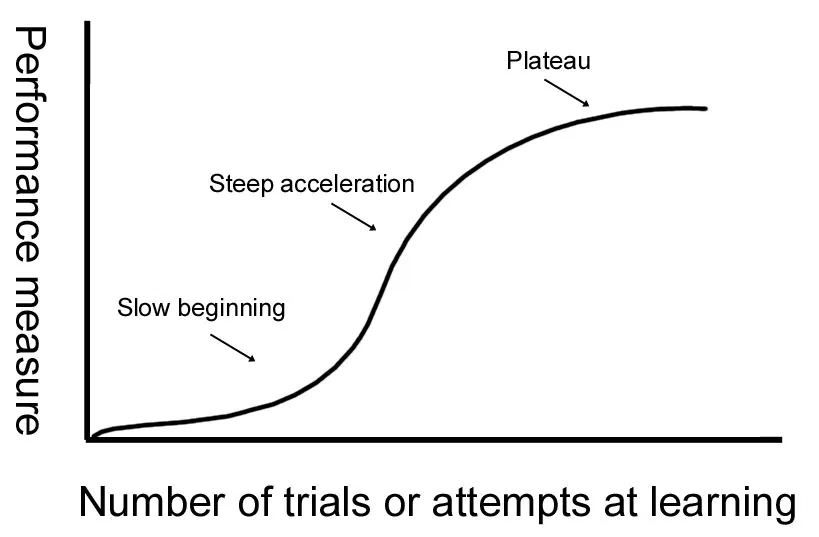Welcome to my harmonica teacher’s blog. My name is Steve, and today we are going to talk about learning to play the harmonica, in particular, we’ll see how to fight those moments in which you feel you’re losing motivation and start to procrastinate.
A long and tiring learning path like learning to play the harmonica necessarily leads us to clash with moments of fatigue, stress, and low motivation.
Two factors can contribute to the loss of motivation: one is related to our nature; the second is you! Let’s talk first about the natural cause.
The typical learning curve, it is not a straight line, but seems more like what you see in the picture below:

As you can see, the curve rises a bit in the beginning, where you are becoming familiar with the basics of the instrument. The second stage occurs when you have enough experience to put together some of the skills you acquired. Then your progress slows down because of some physical limitations, and the situation can get worse with stress and fatigue.
The pattern shown by the learning curve repeats itself, and every time you start to learn a new concept or task, you will go through these steps. During the acceleration phase, you will feel excited and motivated, once you reach the plateau, you might become distracted, and you start to feel like you are losing energy and motivation.
Let’s talk about the second cause of stress when you learn to play the harmonica: you! If you don’t study the right things at the right time, you will raise your level of stress, and you will start to lose the desire to practice. How? Easy, for example, if you try to learn too soon about bending, or overblowing, or if you want to learn how to play what others do because it’s cool, in other words, whenever you don’t give yourself the time and the way to learn gradually. Remember this path: too difficult the task means fatigue that brings few results and ends with demotivation. Vice versa, correct difficult tasks lead to results and excitement that increase motivation. I know many, but many that don’t understand this concept, try not to be one of them and you’ll become a great harmonica player, it will take time, but you will get there.
How to manage the phase of fatigue and the moments of discomfort?
First of all, accept that it is normal and that the negative period will pass, and it is also essential not to blame yourself, what happens not always depends on you, it is also the fact that you are a human being.
When you realize that you have reached the limit, you allow your body and your mind to rest and distract yourself, thinking, and doing something different. Remember that your mind does not like to be hammered continuously with the same topic, try to intrigue it with something light and not challenging. You can listen to music or stay silent; you can watch movies, hang out with friends, do an outdoor activity.
If you feel exhausted physically, take a rest, do not practice because it would not be productive. Better to relax. If you don’t want to study, don’t do it, no one forces you to do things, and you don’t have to force yourself. If the period of listlessness lasts very long, then you should understand if there is something wrong in general. Finally consider this: we can change your mind, It could also be that you have tried to do something that you don’t care enough or that isn’t for you, you can find something else to do, changing your mind is allowed! Of course, I wish you to continue playing the harmonica for always!
Share this page with your friends!